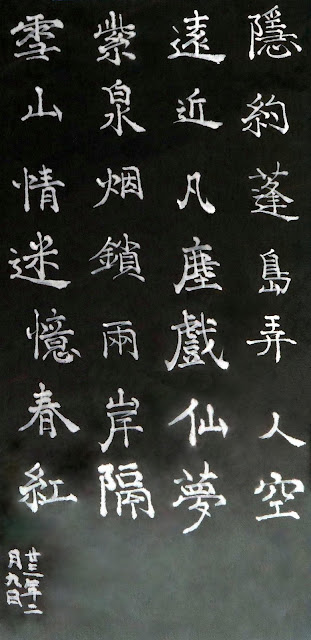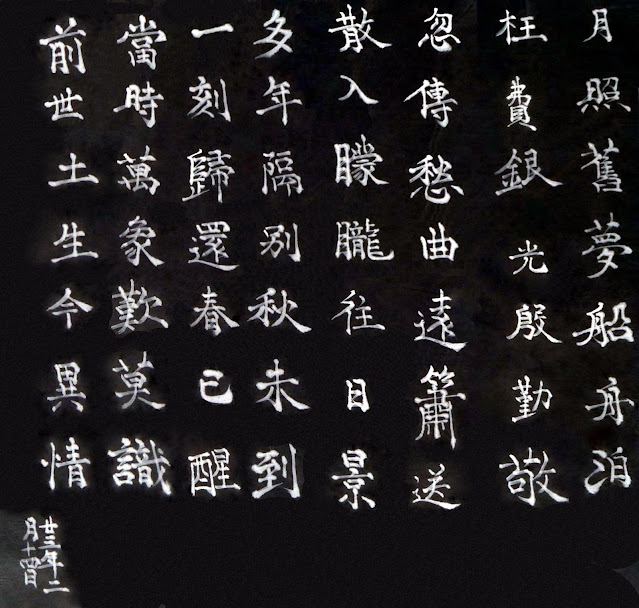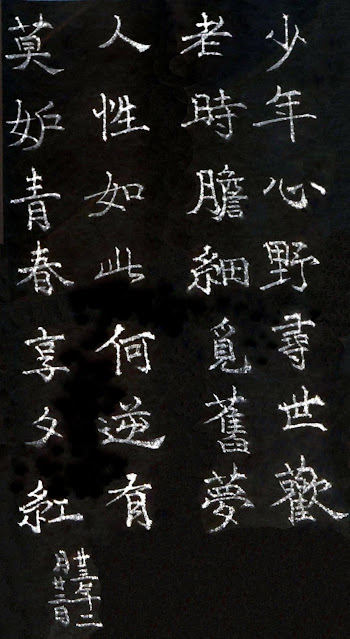In liking him, he would live. In
loathing him, he would
die. This being the case of wanting him to live
and yet wanting him to die, this is then baffling.
--------------------------------
吾見其進也, 未見其止也 (論語. 子罕)
a.
進, improvement, progress,
forward, 進步
b.
止, stop, cease, 停止
我看到他有進步! 沒看到過他停止!
I have seen his
progress! Never saw his
cessation!
Note: 孔子說起他的最好的學生, 顏淵
This is said by Confucius in reference to his best student, 顏淵
----------------------------
愛而知其惡,
憎而知其善 (禮記.曲禮下)
a.
惡, vice, short coming,
weakness, 缺點
b.
善, strong point, virtue,
virtuous, 好的地方
愛他但也知道他的壞處,
恨他但也知道他的好處
In fondness, his undesirable
traits are known, in animosity, his charms are
known.
----------------------------
始吾於人也,
聽其言而信其行
今吾於人也,
聽其言而觀其行 (論語. 公冶長)
a.
始, in the beginning of, at
first, 開始, 當初
b.
今, now, 現在
最初我對於人!
聽到他的話,
就相信他的行為
現在我對於人! 聽到他的話, 就觀察他的行為
In the beginning, in regards to people when I hear their words, I believe their
actions.
Now, in regards to people when I hear their words, I observe their
actions.
----------------------------
其人存則其政舉, 其人亡則其政息 (禮記.中庸)
a.
政, governance, policy, 政策
b.
舉, flourish, rise, put into
effect, 施行
c.
亡 disappear,
die, cease, 不在, 不存
d.
息, cease, die, 停止, 消失
那個人存在他的政策可施行, 那個人不在他的政策就消失了
He who exists, his policies
will be in effect, he who is no longer around, his policies will disappear.
----------------------------
富與貴, 是人之所欲也, 不以其道, 得之不外也 (論語.里仁)
a.
道 orthodoxy,
proper way or manner, 正確方法
b.
以 in
accordance with, according to, in the light of, on the basis, 按照
c.
外 get
along with, 相處, 身外
富有高貴,
這是每個人都希望的, [如果] 不用它的正確方法,
得到它也不接受!
Wealth and honor, these are
the wants of everyone!
By not using according to the proper manner,
even in getting it will be indefensible!
Note: 所 is a
particle when used before a verb, it is a grammatical function to represent
something that represents that action.
----------------------------
不知其子視其友, 不知其君視其左右 (荀子. 性惡)
a. 子, person
b. 左右, left and right, the surrounding people.
不了解那個人, 看他的朋友 (就知道了)
不了解那個國君, 看他的身邊的人(就了解了)
To understand a person, look at his friends,
To understand a ruler, look at his retinue.
Note: 子 is a bit problematic because in some explanations, it means “son” whereas in the video, it means “this/that person”. It does not matter which version is correct. The point here is how 其 functions.Textually, without context, it can be also translated as,
To understand his (father’s) son, look at his (the
son) friends.
To understand its (the nation’s) ruler, look at his (the ruler) retinue.
----------------------------
如有政, 雖不吾以,
吾其與聞之. (論語.子路)
a.
政, government affairs, 政事
b.
以, use, 用
c.
不吾以, don’t use me
如果有政事,
雖然不用我[的主張], 我大概[還是要] 參與了解這些事的
If there are matters of official nature, even though
my opinion is not considered, most probably I should listen in on them.
----------------------------
有始有卒者, 其惟聖人乎! (論語.子張)
a. 卒, the end, die, finish, finally, at last, 結束, 完畢
b. 惟, only, 只
c. 乎, modal particle indicating suggestion, 吧
[做事]有始有終的人,
也許只有聖人了!
Those who are able to start and finish [a project], perhaps only sages [can do it]!
----------------------------
今之眾人其下聖人也, 亦遠矣, 而耻學於師,
是故, 聖益聖, 愚益愚, 聖人之所以為聖,
愚人之所以為愚, 其皆出於此乎? (唐. 韓愈. 師說)
a.
眾人, the ordinary masses,
people,
b.
下, be inferior to, 差於, 不如
c. 遠, by far, much lower, (an intensifier for comparison)
d. 益, even so, more so, all the more, 更
現在的人, 他們 差於聖人!
也是比得遠了, 而且向老師學習為耻.
因為這個緣故, 聖人就更聖明了,
愚人就更愚蠢了. 聖人之所以成為聖人,
愚人之所以成為愚人. 也許都是由於這個吧?
People of nowadays, they are inferior to sages and by far lesser than
them. Learning from teachers is a shame.
Hence, sages become more sagacious, the foolish becomes more
stupid. It’s the reason sages are sages;
the reason that fools are fools. Perhaps, is it not all these stemmed from this?
----------------------------
仲尼曰: 始作俑者, 其無後乎,
為其象人而用之也,
如之何其使斯民饑而死也? (孟子.梁惠王上)
a.
仲尼, courtesy name of Confucius.
b.
始作俑者, the first person to make funerary figurines i.e. the originator of an evil practice. c.
後, descendants, 後代
d. 為, because, 因為
e. 如之何, how can, 怎能
f. 斯, these, 這些
孔子說:
最作人俑的人, 也許沒有後代吧? 因為那些俑像人形而用它來隨葬. [這樣尚且(not even, yet, still) 不可以] 那些官吏怎樣可以讓這些人民饑餓而死呢?
Confucius
said, “The first person to make funerary figurines, isn’t
it true that he would have no posterity? This is because he made those images of men for this
purpose. How can his officials let these people die by starvation?
----------------------------
不在其位, 不謀其政 (論語.太伯)
a. 位, position, 職位, job position
b. 謀, participate in planning, 參與, 做
c. 政, governance, government business, 工作, 政事
不在那個職位, 就不要參與那個職位的政事.
Those who are not in that position, should not participate in
government business of that position.
Note: In
other words, mind your own business,
----------------------------
名曰愛之, 其實害之. (唐.柳宗元.種樹郭橐駝傳)
a. 名, in name, norminal, 名義上, 表明上
名義上說愛它,
這樣做實際上是害了它
In
name [you] said love it, but this [way] in
actual fact, [you are] harming it.
----------------------------
即以其人之道, 還治其人之身 (宋.朱熹.四書集注)
a. 即, exactly, precisely, only, simply, just, even if, if, so, that is, 就是
b. 道, method, the way, 方法
c. 治, to treat, to counter, to deal with, to handle, 對付
就是用那個人的方法, 反過來對付在那個人的身上.
That is to use that person’s way to deal back on that person’s body.
Note:
In other words, “tit for tat”
----------------------------
其施厚者其報美,
其怨大者其禍深 (淮南子.繆稱)
a. 施, to accord, to give, to show respect, 給予
b. 厚, generosity, 厚重, 多
c. 報, repay, reward, 回報
d. 怨, resentment, hatred, 仇怨
那些實行仁厚的人, 他們的回報是美好的,
那些積怨很大的人,
他們的禍患很深.
Those
who are beneficent to others, their payback
would be good. Those with great hatred [in heart]
their retribution will be deep.
----------------------------
Wednesday, January 25, 2023
Wednesday, February 8, 2023
Back to 之
Next
Lesson #1 “之” 01















